Teenager Lashes Out At Her Irresponsible Younger Brother For Never Doing His Part With Their Dog Chores
Dogs are a lot of work. They need to be fed, walked, played with, and let out often.
Luckily, most kids love taking care of their furry friends and are more than happy to do so while their parents are busy. As for parents, they think that the cuteness of the dogs is something that kids can't resist.
That's probably why they think it's a good idea to have their little ones take care of the dog. They figure it'll give the kids something to do and teach them responsibility.
But in reality, it's the adults who need to take charge. Remember that children imitate what they see from their parents.
If the little ones see their mom and dad handling their family pet responsibly, they'll learn how to do so too. As a dog owner with kids, it's important to ensure you are prepared for the commitment of caring for your canine companions, not just in the moment, but in the long term as well.
It may mean scheduling extra dog walking sessions or puppy playdates with trusted friends. If parents completely give the responsibility to their children, it could cause problems.
Recently, a teenager decided to ask the "Am I The A**hole?" community about her situation. To put it in a nutshell, she and her little brother are supposed to be taking care of the dog.
But in the end, she is picking up the slack for her lazy brother.
The original poster (OP) has a mean younger brother.
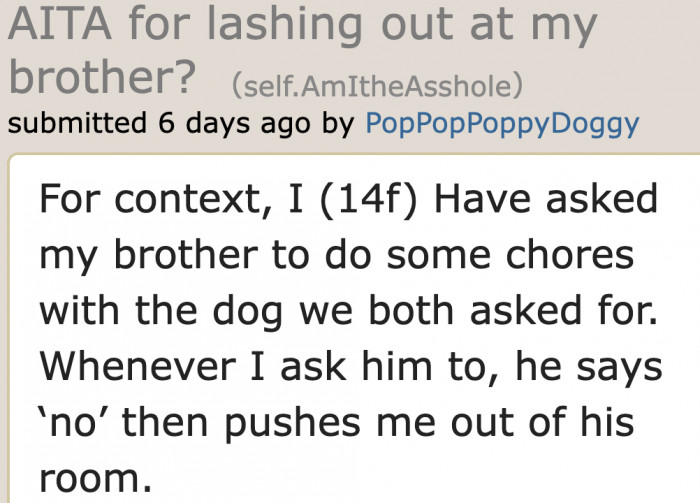
She took all of the responsibility because of her brother's laziness.
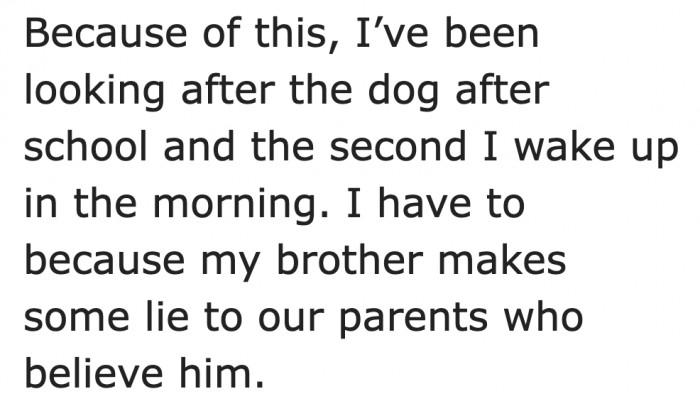
One time, she was unable to take care of the dog because of her exams.
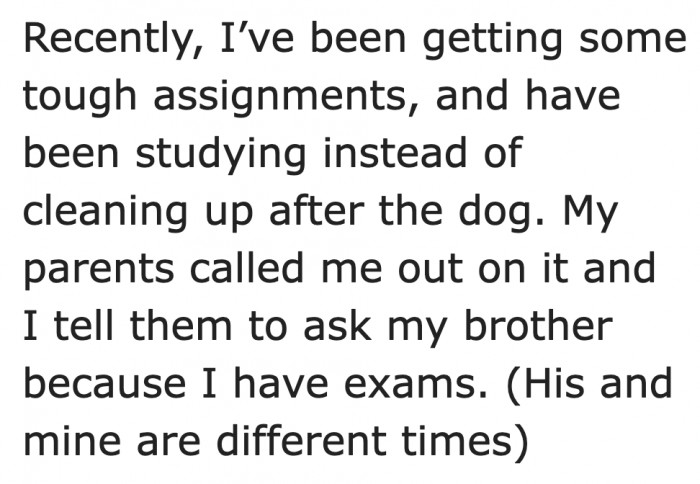
Sibling Dynamics and Shared Responsibilities
Dr. Jane Foster, a developmental psychologist, highlights that shared responsibilities among siblings can sometimes lead to conflict, especially when expectations are not aligned.
Research shows that sibling dynamics often reflect broader family patterns, including negotiation, conflict resolution, and emotional support.
When one sibling fails to contribute, it can create feelings of resentment and frustration in others, impacting the overall family atmosphere.
Sibling Responsibilities and Emotional Bonds
The shared responsibility of caring for a pet can often highlight the complexities of sibling relationships. Research in developmental psychology shows that tasks like pet care can help build emotional bonds and teach responsibility. However, when one sibling consistently shirks these duties, it can lead to feelings of frustration and resentment in the other.
This dynamic often reflects larger patterns of interaction where one sibling may feel overburdened while the other feels entitled or disengaged from their shared responsibilities.
She got so mad.
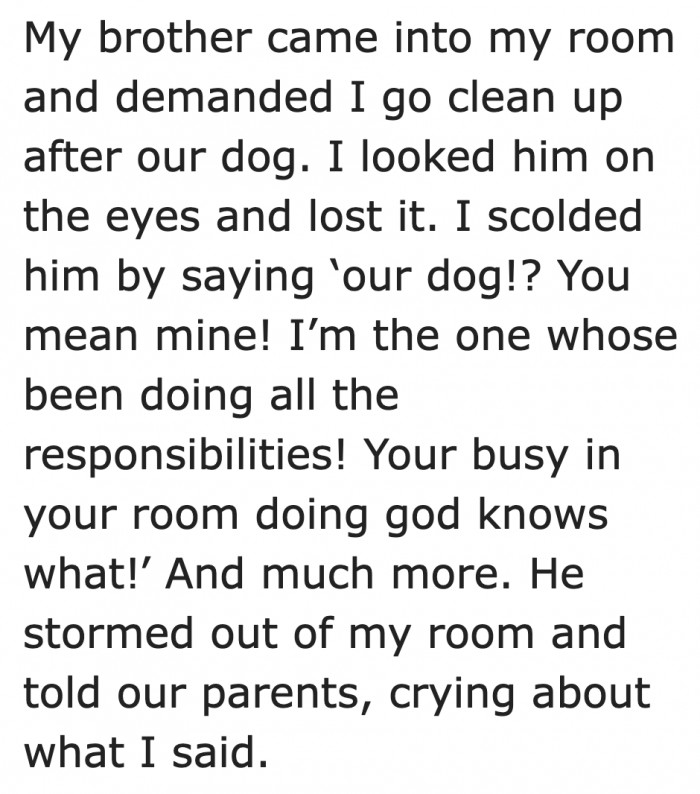
The parents are on the little brat's side, but her grandparents are on her side.
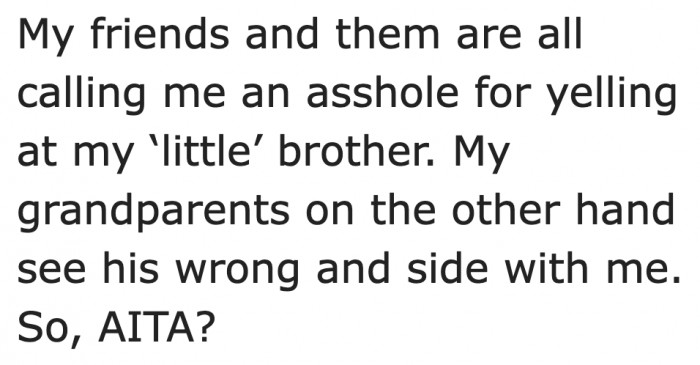
The OP needs help from her grandparents to explain the situation to her parents.
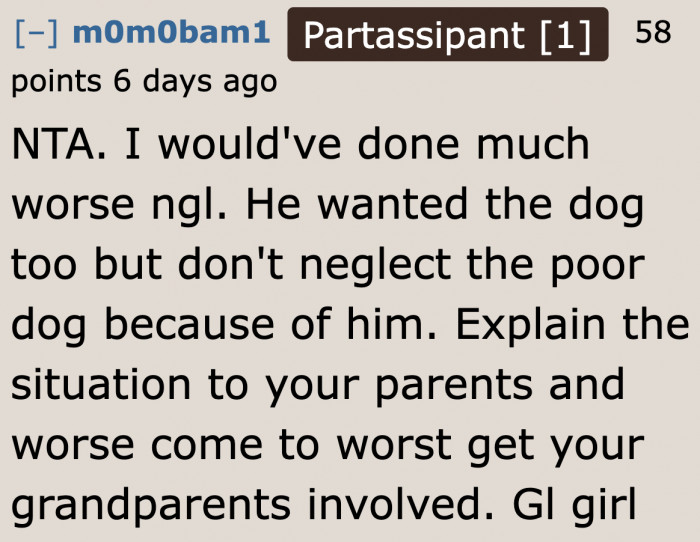
A family psychologist points out that the teenager's frustration may stem from a deeper need for fairness and equity in family responsibilities.
Studies indicate that children and adolescents are particularly sensitive to perceived injustices, which can lead to emotional outbursts when they feel burdened by unequal expectations.
Addressing these feelings is crucial for maintaining healthy sibling relationships.
From a psychological perspective, the imbalance in responsibilities can lead to a breakdown of trust and communication between siblings. Studies indicate that when individuals feel unsupported in collaborative tasks, it can create emotional distance and conflict. Understanding these dynamics is essential for fostering healthy sibling relationships.
The lying might become a habit. This family needs to do something about it.
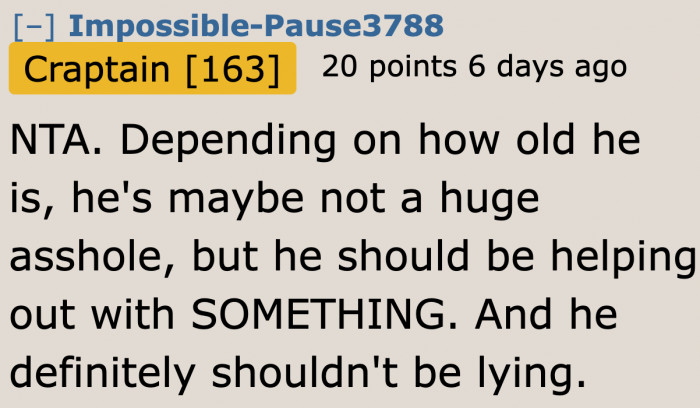
The parents are making a huge mistake with their son.
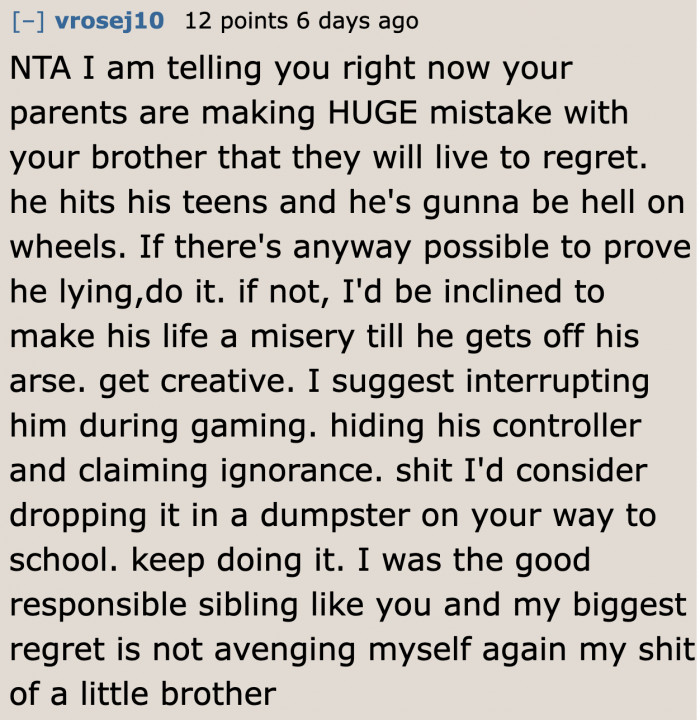
Someone's willing to slap their sibling if placed in the same situation.
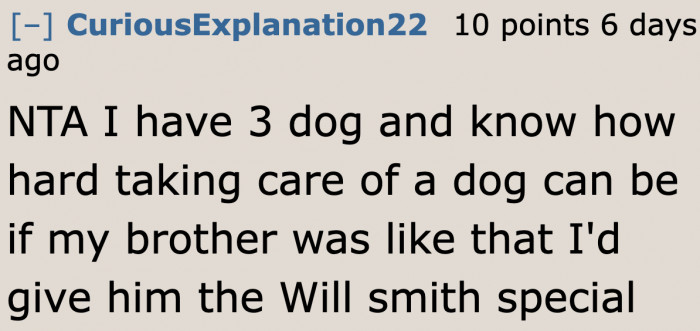
Building Cooperation Among Siblings
Experts recommend implementing a chore chart or system that clearly outlines responsibilities for pet care.
This can help siblings understand their roles and encourage cooperation rather than conflict.
Involving siblings in discussions about pet care can also foster a sense of ownership and responsibility, making them more likely to contribute.
The Role of Open Communication
To improve the situation, open and honest communication is key. Engaging in discussions about feelings and responsibilities can help siblings express their frustrations and work towards a more equitable distribution of pet care duties. As Dr. Terri Orbuch, a relationship researcher, states, "Effective communication is the foundation of any healthy relationship, including those between siblings." Fostering a safe environment for dialogue can significantly enhance relational dynamics. Encouraging siblings to collaborate on pet care tasks can also promote teamwork and strengthen their emotional connection.
Others would have done something worse to the brother.

It's time to involve the adults in this kind of problem.

Others wanted to know how old the brother is.
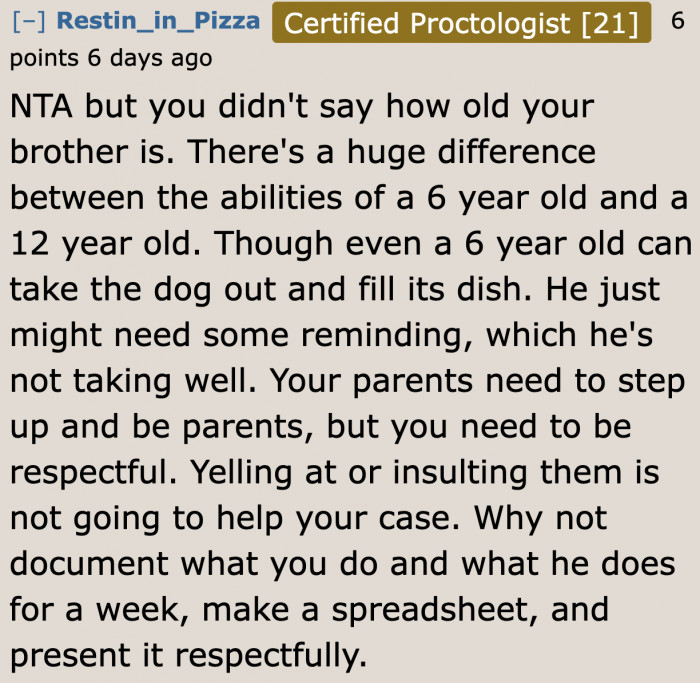
Social psychologists emphasize the importance of shared experiences in building connections and cooperation among siblings.
Research indicates that engaging in joint activities can strengthen relationships and improve communication skills.
Encouraging siblings to work together on pet care tasks can not only alleviate frustration but also enhance their bond.
Moreover, addressing the underlying emotional motivations for participation can help siblings understand each other's perspectives. Psychological studies suggest that exploring feelings of obligation and autonomy can lead to more balanced interactions and reduce conflict.
Their parents need to enforce the duties and split the responsibilities fairly.
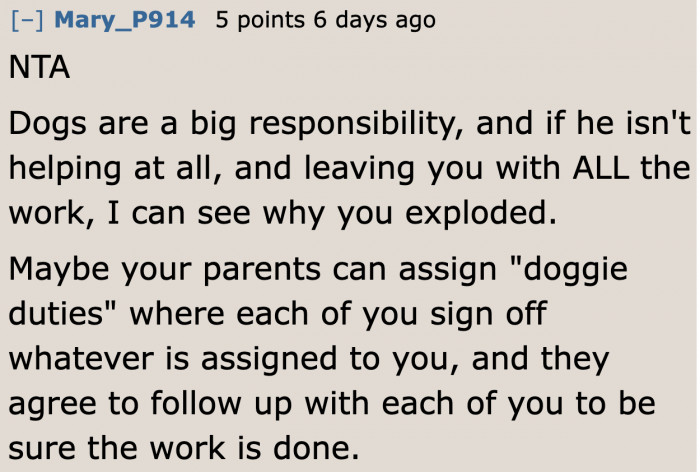
The OP needs to have a serious talk with her parents.
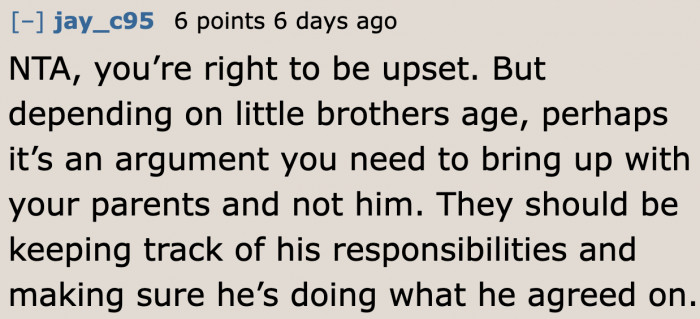
The OP wasn't clear about what the little brother was really doing.
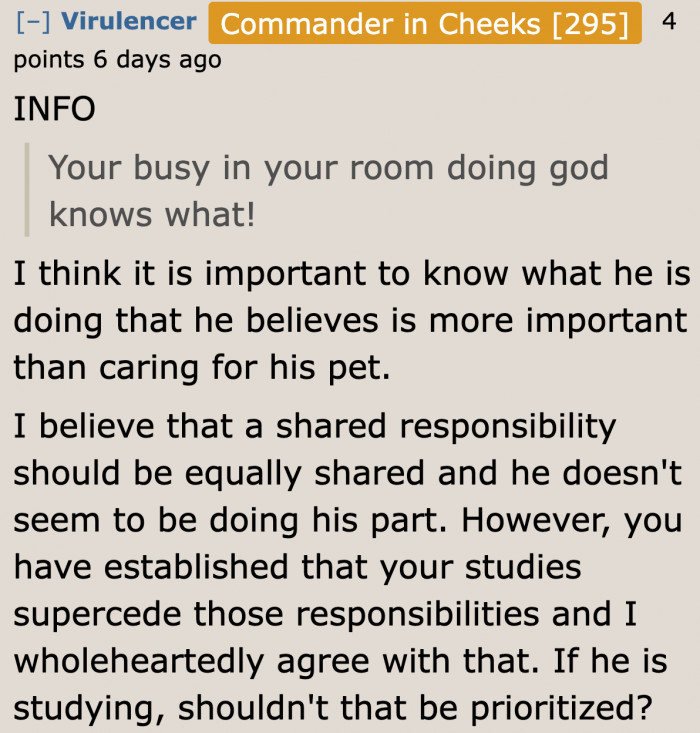
Practical Strategies for Shared Responsibilities
Implementing a schedule for pet care tasks can help clarify expectations and ensure that both siblings contribute equally. This structured approach can alleviate feelings of resentment and promote accountability. Additionally, involving a neutral third party, like a parent or guardian, can help mediate discussions and ensure fairness in the division of responsibilities.
Ultimately, fostering a sense of shared ownership can lead to improved emotional bonds between siblings while ensuring the pet receives the care it needs.
This redditor believes that no further info is needed. It can be easily assumed that the brother is just being lazy.
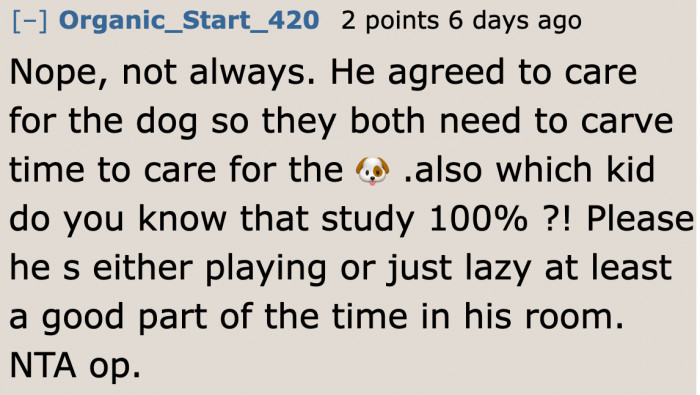
It's the parents who should be teaching this.

Maybe it's better to rehome the dog if it's not getting the care it needs.
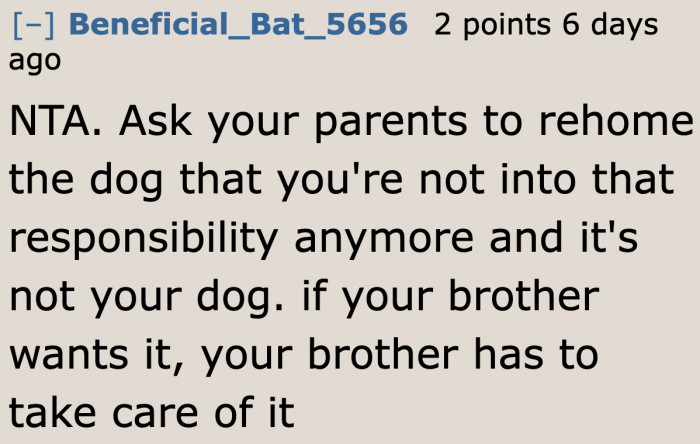
In conclusion, addressing the dynamics of sibling responsibilities when caring for a pet is crucial for maintaining healthy relationships. By promoting open communication and implementing practical strategies, siblings can work together to create a more balanced approach to pet care.
A redditor believes that both sides are wrong.
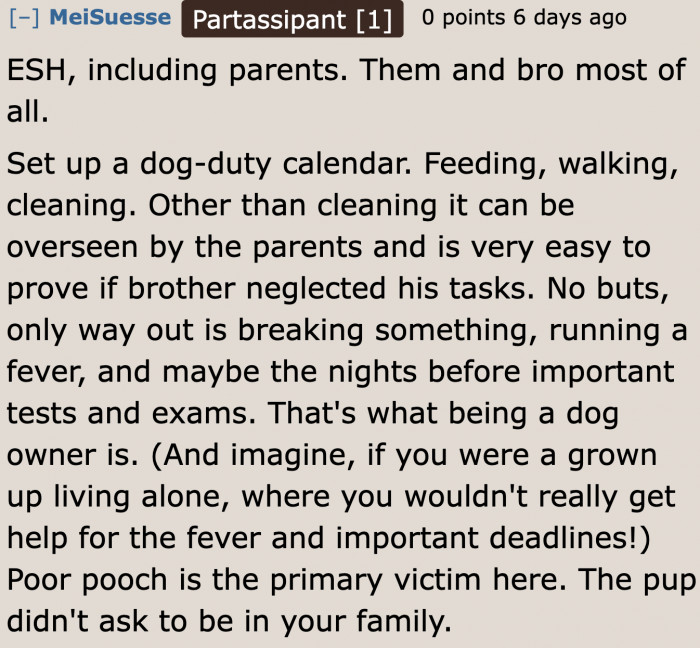
The OP still needs to pick up the slack in this situation. You can't just leave a dog that dirty.
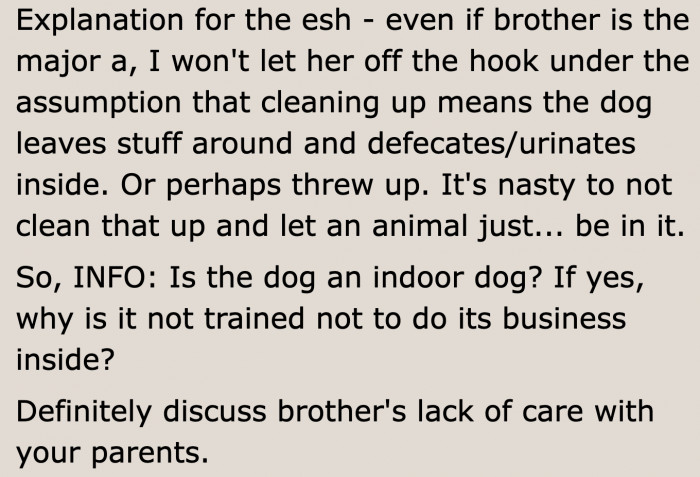
This redditor smells favoritism.

Ultimately, being responsible pet owners means realizing that although dogs are a lot of work — they are worth every ounce of love and effort. Parents should make this clear to their children before they actually get the dog.
It's time for the OP's parents to get involved in taking care of the dog. They need to set up schedules for their children to strictly follow.
Psychological Analysis
This situation reflects common challenges in sibling dynamics regarding shared responsibilities. When one sibling consistently avoids pet care duties, it can create tension and frustration in the other. Addressing these issues through open communication and structured responsibilities can help foster healthier sibling relationships.
Analysis generated by AI
Analysis & Alternative Approaches
In summary, the dynamics of shared responsibilities for pet care can significantly impact sibling relationships. Open communication and practical strategies are essential for fostering cooperation and understanding, ensuring that both siblings feel valued and supported in their roles.
Analysis & Alternative Approaches
Sibling dynamics can significantly influence how responsibilities, like pet care, are managed within a family.
As noted by Dr. Madeline Levine, a renowned child psychologist, "Encouraging children to take responsibility for shared tasks fosters a sense of accountability and strengthens family bonds." By addressing conflicts openly and collaboratively, families can create a more supportive environment for all members, including pets, as emphasized by Dr. Esther Perel, who states, "Healthy relationships thrive on communication and shared responsibilities."



